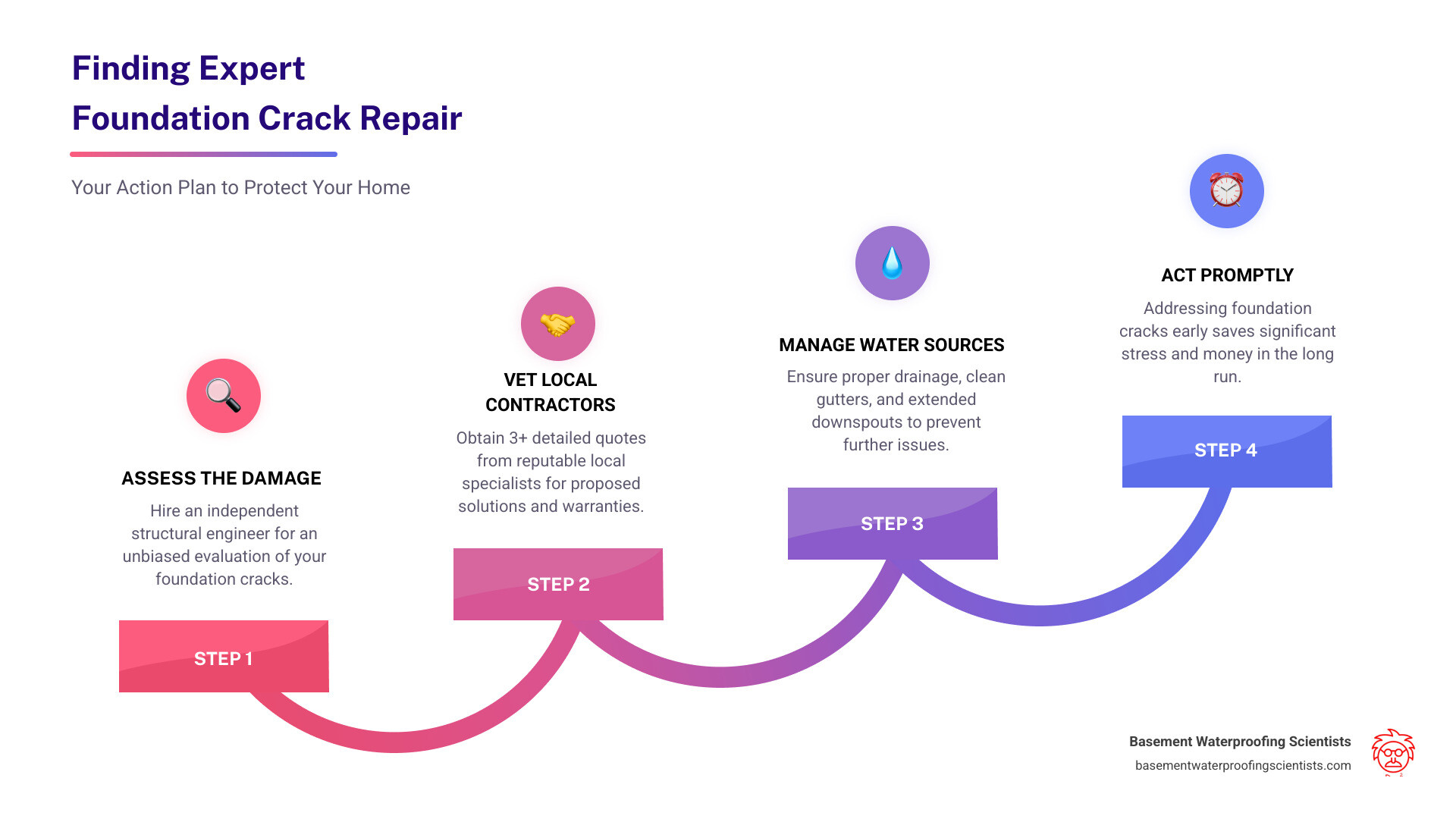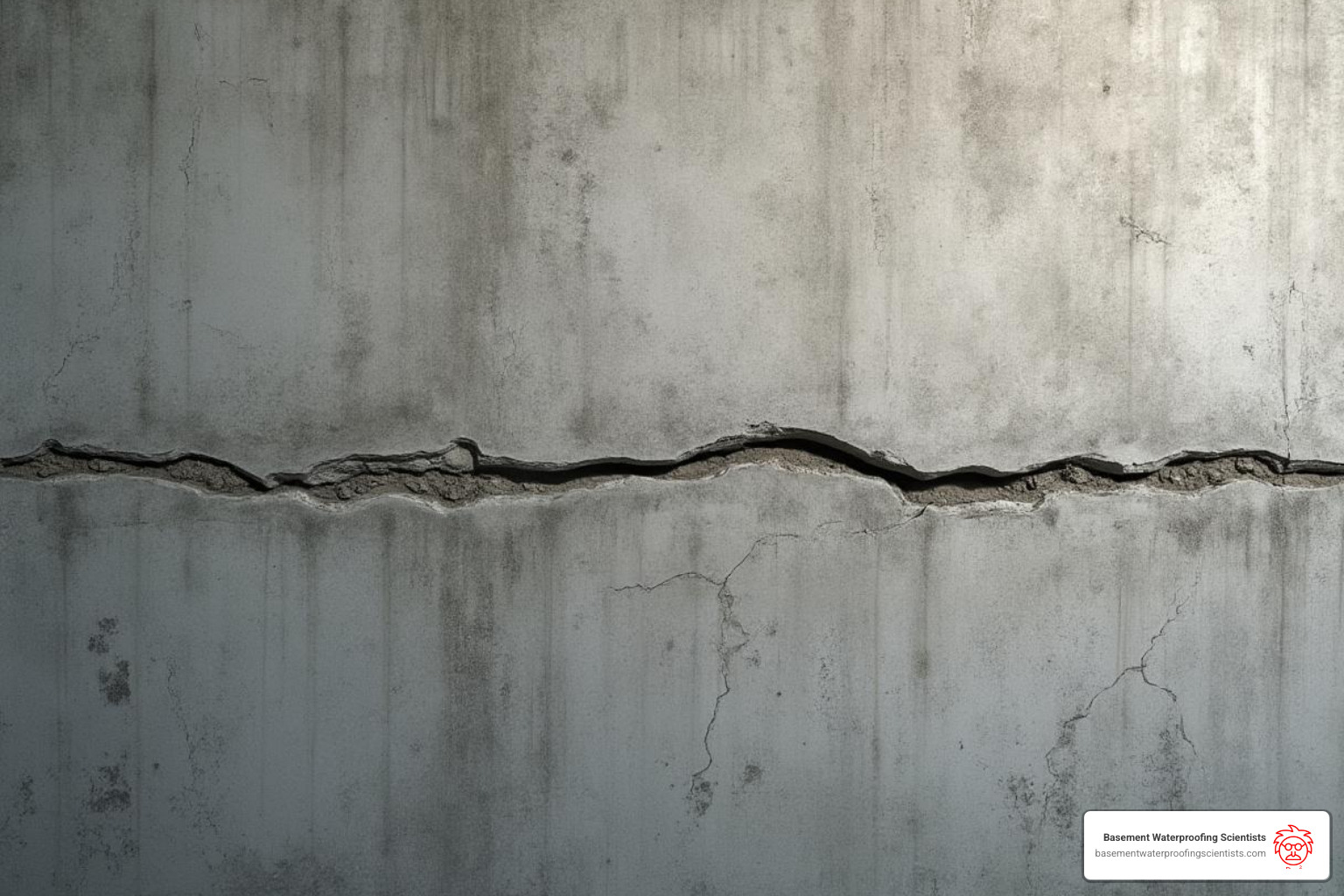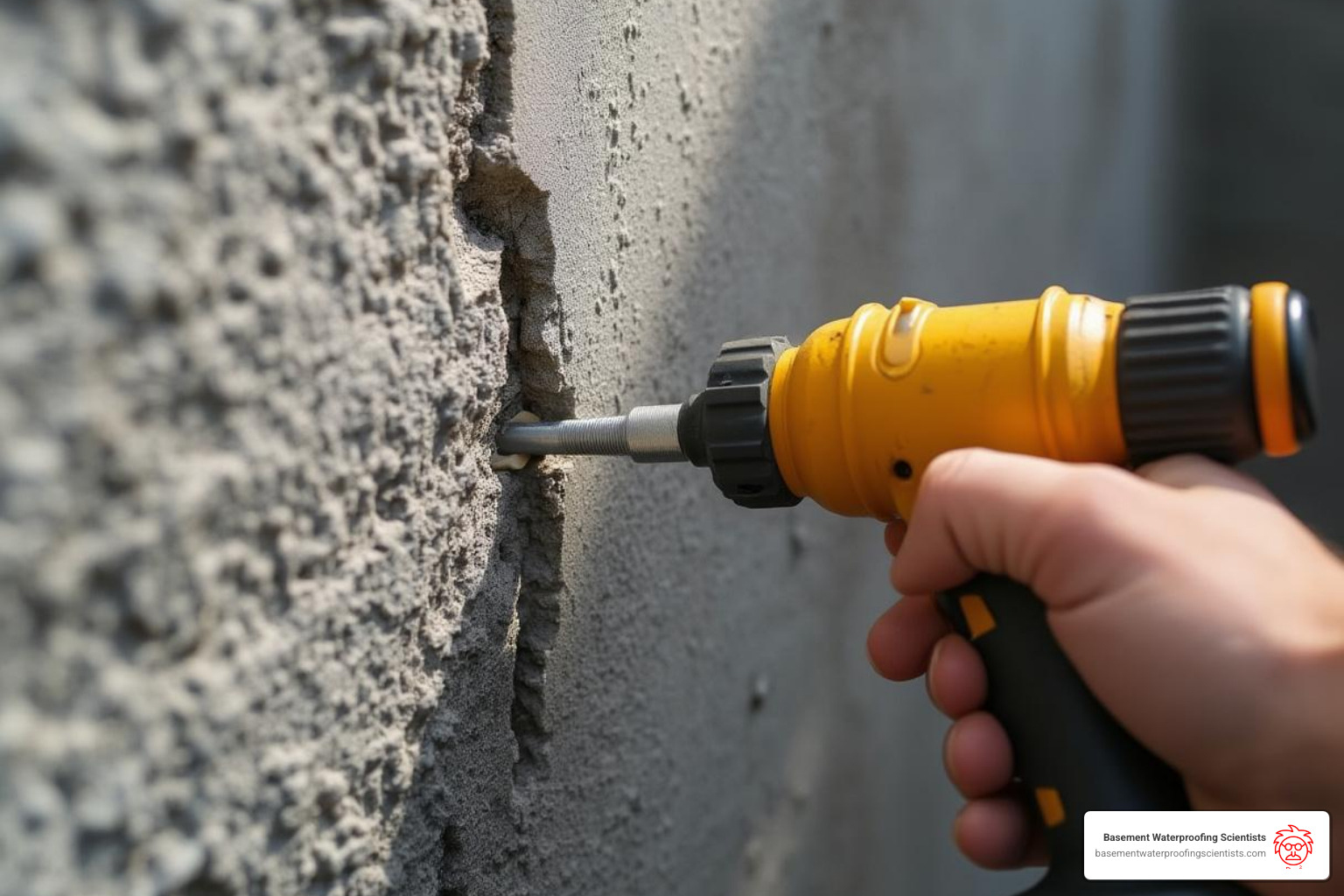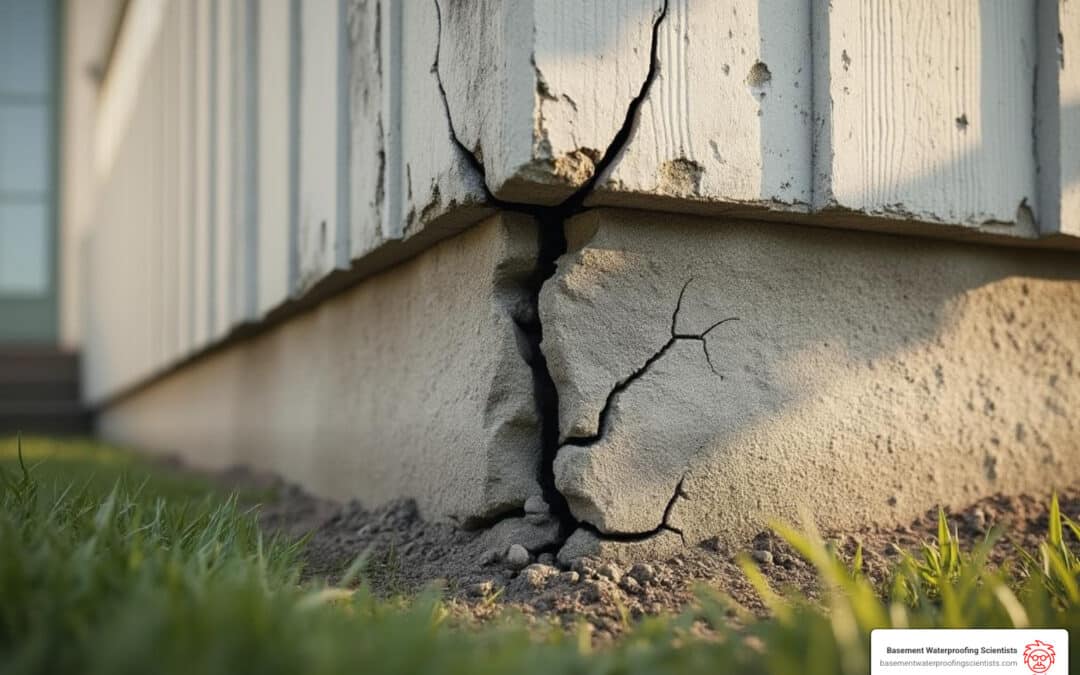Cracks in Your Foundation? Here’s What to Do
If you’re searching for foundation crack repair near me, you’ve likely spotted a worrying sign in your home’s foundation. While unsettling, taking prompt, correct action can save you stress and money.
Here’s how to find expert help:
- Get an Unbiased Assessment: Hire an independent structural engineer for an honest evaluation of the crack and the required repair, without a sales pitch.
- Contact Local Specialists: Search for “foundation crack repair near me” to find reputable companies. Get at least three detailed quotes and compare their solutions, costs, and warranties.
- Address Water Issues: Many foundation problems start with water. Ensure gutters are clean, downspouts direct water away from the house, and the ground slopes away from the foundation.
Ignoring even small cracks can lead to major structural damage, flooding, and mold, with repairs costing thousands more than an early fix. I’m Darin Garvey, and at Basement Waterproofing Scientists, our team has over 30 years of experience in leak detection and targeted solutions. We specialize in effective foundation crack repair near me, and this guide will walk you through protecting your investment.

Quick look at foundation crack repair near me:
Decoding the Cracks: Warning Signs of Foundation Problems
Not all foundation cracks are created equal. Understanding the difference between a minor flaw and a serious structural issue is key to determining the urgency of repairs.
What to Look For: Structural vs. Non-Structural Cracks
Foundation cracks are generally categorized as structural or non-structural. This distinction is crucial as it dictates the required repair.

Common crack types include:
-
Horizontal Cracks: Often the most serious, these run parallel to the ground. They indicate immense outside pressure on your foundation walls, usually from water (hydrostatic pressure) or expanding soil. This pressure can cause walls to bow inward and risk collapse, requiring immediate attention from a foundation crack repair near me expert.
-
Stair-Step Cracks: Found in brick or concrete block foundations, these zig-zag cracks follow mortar lines. They often signal that one part of the foundation is settling faster than another, indicating an underlying structural issue that needs a professional evaluation.
-
Vertical Cracks: While generally less serious, these up-and-down cracks can still be problematic. Small hairline cracks are common from concrete curing, but wider, growing, or leaking vertical cracks can indicate settlement or stress and allow water intrusion.
-
Cracks Larger Than 1/4 Inch: As a rule of thumb, any crack wider than 1/4 inch warrants an expert opinion. While smaller cracks are often non-structural, larger ones suggest significant movement or stress.
-
Shrinkage Cracks: These are small, thin cracks that appear as new concrete cures. They are typically non-structural but can still allow water to seep into your basement.
Understanding these differences is the first step towards effective Understanding Structural Basement Repair.
Beyond the Cracks: Other Telltale Signs
Foundation problems can manifest in other ways throughout your home:
-
Sticking Doors and Jammed Windows: Foundation shifts can twist frames out of square, causing doors and windows to bind.
-
Uneven Floors: Sloping or bouncy floors are a classic sign of foundation settlement, where parts of the base are sinking.
-
Gaps in Walls: Look for gaps between walls and floors/ceilings, or new cracks in drywall, especially around door and window frames.
-
Basement Water Intrusion: Puddles, damp spots, or water seeping through cracks are clear signs of a compromised foundation, which can lead to mold and further damage.
-
Musty Odors: A persistent damp, earthy smell in your basement often indicates hidden moisture problems from water intrusion.
-
Cracked Chimney: A leaning or cracked chimney can point to foundation movement, as they are heavy and susceptible to settling.
Noticing several of these signs together is a clear signal to seek expert help. Learn more by exploring our resources on House Foundation Repair Near Me.
The Root of the Problem: What Causes Foundation Cracks?
Foundation cracks are rarely random. They are typically a result of environmental factors, soil conditions, and construction methods. Understanding the cause is key to finding the right solution.
Soil and Water: The Primary Culprits
Soil and water are the main drivers of foundation issues, putting immense stress on your home.
-
Hydrostatic pressure is the force of water in saturated soil pushing against your foundation. After heavy rain or due to poor drainage, this pressure can become strong enough to bow basement walls inward, causing horizontal cracks.
-
Expansive clay soil, common in Pennsylvania, New Jersey, and Delaware, acts like a sponge. It swells when wet and shrinks when dry, putting constant stress on the foundation and causing it to lift or settle unevenly.
-
Soil settlement occurs as the ground under your home naturally compresses or washes away. If this happens unevenly (differential settlement), it creates stress that inevitably leads to cracks.
-
Poor drainage is a common and preventable cause. Clogged gutters, downspouts discharging too close to the home, and improper grading (ground sloping towards the house) all allow water to pool around the foundation, leading to the problems above.
-
Plumbing leaks under your slab can saturate the soil, causing localized expansion, erosion, and settlement, often going unnoticed for a long time.
Construction and Age-Related Factors
Your home’s construction and age also play a role in foundation health.
-
Poor soil compaction before the foundation was poured can lead to uneven settling over time. This was common in homes built in the 1950s and 1960s.
-
Concrete shrinkage is a natural part of the curing process and usually results in harmless hairline cracks. However, an improper concrete mix or rapid drying can cause larger, more problematic cracks.
-
Substandard materials or techniques used in original construction, especially in homes built before the 1950s with unreinforced concrete, can make foundations more prone to cracking.
-
Older homes have simply endured more long-term stress from soil movement and water pressure, making them more susceptible to damage than newer homes built to modern codes.
Understanding these causes helps us devise the most effective repair strategy. For a deeper dive, visit our page on More about foundation issues.
A Guide to Common Foundation Crack Repair Methods
Once we’ve identified the crack type and its cause, we can select the right solution. At Basement Waterproofing Scientists, we use a range of trusted techniques, from simple sealing to structural stabilization, to provide a lasting fix.
Sealing and Waterproofing Non-Structural Cracks
For smaller, non-structural cracks that may let in moisture, our focus is on sealing and waterproofing to keep your basement dry.

Our trusted sealing methods include:
- Epoxy Injection: For dry cracks, epoxy is a strong adhesive that bonds the concrete, restoring some of its original strength. It’s excellent for wider cracks needing structural bonding.
- Polyurethane Foam Injection: Ideal for actively leaking cracks, this is our preferred method. We inject a high-pressure urethane foam that expands on contact with water, creating a flexible, permanent waterproof seal. It can handle minor future movements without re-cracking. This “no-dig” solution is quick, clean, and uses odorless materials.
- Waterproofing Sealants: For fine hairline cracks or exterior applications, we may use specialized sealants, often in conjunction with other methods for a comprehensive solution.
Our team is expert in crack sealing. Whether you need a Concrete Wall Crack Sealer or want to know How to Seal Exterior Foundation Cracks, we can help.
Stabilizing Structural Damage
When cracks indicate a deeper structural problem, sealing isn’t enough. We must reinforce the foundation to stop further movement and restore stability.
- Carbon Fiber Straps: We epoxy these thin, incredibly strong strips to the interior of a bowing foundation wall. They prevent further inward movement and are a durable, low-profile solution.
- Steel Reinforcement (I-Beams): For more severe bowing, we install vertical steel I-beams against the wall, anchoring them to the floor and ceiling joists for powerful support.
- Wall Anchors: This method uses interior steel plates connected by a rod to an anchor buried in stable soil outside. The anchors can be tightened to stabilize or even straighten the wall over time.
- Underpinning: For significant settlement, we extend the foundation’s footings to reach more stable ground. This is typically done by installing steel piers (push or helical) that transfer the home’s weight to competent soil. This complex process requires expert design and execution.
Here’s a quick comparison of two popular wall stabilization methods:
| Feature | Carbon Fiber Straps | Steel Reinforcement (I-Beams) |
|---|---|---|
| Application | Applied directly to the wall’s interior with epoxy | Vertical steel beams anchored to floor and ceiling |
| Strength | High tensile strength, prevents inward bowing | Strong compressive strength, prevents bowing and pushing |
| Aesthetics | Low profile, can be painted over | More noticeable, protrudes from the wall |
| Ideal For | Moderately bowed walls, horizontal cracks | Severely bowed walls, significant structural issues |
| Installation Time | Generally quicker, less disruptive | More involved, may require more disruption |
Lifting Sunken Concrete
For sunken concrete slabs like basement floors or patios, we use modern lifting techniques.
- Slab Lifting (Polyurethane Foam Injection): Also known as “slab jacking,” this process involves injecting high-density polyurethane foam beneath the sunken slab. The foam expands, filling voids and lifting the concrete back to its original position. It’s a fast, clean, and less invasive alternative to concrete replacement.
We offer comprehensive Basement Waterproofing Scientists slab repair services to tackle these specific issues, making sure your concrete surfaces are perfectly level and stable once again. When you’re looking for reliable foundation crack repair near me, you want a team that understands every facet of foundation care.
The Bottom Line: Costs, Timelines, and Insurance
When searching for “foundation crack repair near me,” understanding the potential costs, project duration, and insurance implications is crucial.
How Much Does Foundation Crack Repair Cost?
The cost of foundation repair varies based on the severity of the damage, the repair method, and site accessibility.
-
Minor Repairs: Catching problems early keeps costs manageable. Sealing a simple, non-structural crack with polyurethane foam injection might cost from a few hundred to a couple of thousand dollars. These early fixes often cost just 1% to 3% of your home’s value.
-
Major Repairs: For significant structural issues like bowing walls or extensive settlement, costs are higher, ranging from $5,000 to $35,000 or more. For example, installing braces for shifting walls can cost over $14,000. This highlights the importance of getting an independent structural engineer’s assessment, which can sometimes recommend a much more affordable solution.
-
Foundation Replacement: In the most severe cases, a full replacement may be necessary. This is the most expensive option, often running 5% to 10% of your home’s value.
Our biggest piece of advice is that early repair savings are real. Addressing problems promptly prevents them from escalating into more severe and costly issues. Don’t wait to fix cracks; learn more about How Long is Too Long to Fix Basement Wall Cracks?.
How Long Does It Take and Will Insurance Cover It?
Most foundation repairs, like sealing cracks or installing carbon fiber straps, can be completed in just 3 to 5 days. More complex projects like underpinning will take longer. Our team works efficiently to complete every job without compromising quality.

Regarding insurance coverage, the answer is typically “no.” Standard homeowner’s policies usually do not cover damage from gradual wear and tear, soil settlement, or hydrostatic pressure. Insurance is designed for “sudden and accidental” events, not gradual problems. Always review your policy or contact your provider to understand your specific coverage limitations.
How to Find the Best Foundation Crack Repair Near Me
Choosing the right professional for foundation crack repair near me is critical. Foundation repair is not a DIY project and requires true expertise. Follow these steps to find a reliable team.
Step 1: Start with an Independent Structural Assessment
Before calling repair companies, hire an independent structural engineer. They provide an unbiased assessment and a detailed repair plan because they don’t sell repair services. This report outlines the true cause of the damage and the correct fix. This step can save you money; an engineer might recommend a simpler, less expensive repair than a contractor would, potentially saving you thousands of dollars on an investment that costs only a few hundred.
Step 2: Vetting Local Contractors for Foundation Crack Repair Near Me
With your engineer’s report, you can now find the right contractor. Start by searching for foundation crack repair near me!
- Get multiple quotes: Obtain at least three detailed bids from different companies, providing each with the engineer’s report for an apples-to-apples comparison.
- Check licenses and insurance: Ensure any company you consider is fully licensed and insured. This protects you from liability.
- Read online reviews: Look for consistent positive feedback on platforms like Google regarding professionalism, communication, and quality of work.
- Ask for local references: A reputable company will gladly provide references from past clients. Also, check their standing with local business bureaus.
For more guidance, visit our page on Find a Foundation Contractor Near You.
Step 3: Evaluating the Proposal and Warranty
When you have your quotes, evaluate them carefully. The cheapest option isn’t always the best.
- Review the scope of work: Ensure the proposal clearly details the work, materials, and timeline, and that it aligns with the engineer’s report.
- Look for a lifetime transferable warranty: A strong warranty is a sign of a confident company. This also adds value to your home if you decide to sell.
- Understand the payment schedule: A trustworthy contractor will have a clear payment schedule tied to project milestones, not demand full payment upfront.
Frequently Asked Questions about Foundation Repair
It’s normal to have questions when dealing with foundation issues. Here are answers to some of the most common concerns we hear from homeowners looking for foundation crack repair near me.
When is foundation replacement necessary instead of repair?
Foundation replacement is a last resort, as it is a costly and disruptive process. We almost always recommend repair over replacement. However, replacement may be necessary if:
- The damage is extensive and beyond repair, such as with crumbling concrete or widespread structural failure.
- The foundation has deteriorated to the point where repairs cannot restore its strength or ensure safety.
- In rare cases, the repair costs are nearly as high as replacement costs.
An independent structural engineer and an experienced repair specialist can determine if your foundation has reached this point.
What preventative measures can I take to protect my foundation?
An ounce of prevention is worth a pound of cure. Proactive measures can significantly reduce the risk of future foundation problems, most of which are caused by water.
- Ensure proper drainage: The ground should slope away from your foundation (at least 6 inches of fall over 10 feet).
- Maintain your gutters: Keep gutters clean to prevent overflow that dumps water next to your foundation.
- Use downspout extensions: Extend downspouts to discharge water at least 5-10 feet away from your home.
- Consider landscape grading: If your yard slopes toward your house, you may need to add soil to redirect water flow.
- Be mindful of large trees: Roots from trees planted too close can absorb moisture, causing soil shrinkage and settlement, or grow under and lift the foundation.
For more tips, see our guide on Exterior Wall Crack Repair and Waterproofing.
How do I find a reputable contractor for foundation crack repair near me?
Finding a skilled, trustworthy contractor is key. Here is a summary of the best approach:
- Get a professional assessment first: Hire an independent structural engineer for an unbiased report on what repairs are needed.
- Gather at least three quotes: Use the engineer’s report to get bids from licensed and insured contractors.
- Check reviews and references: Look for companies with a strong positive reputation on Google and with local business bureaus.
- Verify warranty details: A strong, transferable lifetime warranty is a sign of a company that stands behind its work.
Conclusion: Protect Your Home’s Value with Expert Repairs
Finding a foundation crack is unsettling, but it doesn’t have to be a disaster for your biggest investment. The key to protecting your home and your wallet is prompt action. Ignoring warning signs allows small issues to become major structural problems with much higher repair costs.
Early detection and a professional assessment are the most crucial steps in protecting your home’s value. At Basement Waterproofing Scientists, we use our 30+ years of experience and state-of-the-art equipment to pinpoint the source of any leak or structural issue. We provide customized, effective solutions that fix the problem for good, ensuring your basement stays dry and your foundation remains stable.
We offer competitive pricing and stand behind our work with a lifetime guarantee for your complete peace of mind.
So, please, don’t let those foundation cracks keep you up at night any longer. If you’re searching for expert foundation crack repair near me in Philadelphia, Reading, Norristown, Pottstown, Bensalem Township, Upper Darby Township, Bristol Township, Middletown Township, Lansdale, Warminster Township, Springfield Township, Haverford Township, Radnor Township, Willow Grove, King of Prussia, Horsham, Exeter Township, Cumru Township, Ardmore, Bryn Mawr, Quakertown, Royersford, Conshohocken, Hatboro, Collegeville, Pennsylvania, New Jersey, or Delaware, our team is ready to help.


